I'm on a quest to redefine my relationship with the internet and wanted to share a quick micro-thot about it.
I started using Instagram in 2014 by writing smut fanfiction poetry as captions for black and white Tumblr-style photos. I realized very soon that I was bad at it, so I quickly made the poems about how bad my poetry was and how stupid the people on the gram to take anything as good art — in the same aesthetic template of sincerity.
Most girls didn’t catch what I was doing and continued engaging with the same love and encouragement with my mockery of our 2015 posting culture. It made me feel like I was in on something everyone else was too dumb or simple to understand. It made me feel powerful. I didn’t realize it, but it was my first step into being edgy™ on the internet.
It's been over a decade of my active use of the internet and, like most things in the world, I too, got worse. I grew up with a compulsive need to be different as a tool for value and attention, more popularly known as being a middle child. I have given up on things I enjoyed so much because I saw other people enjoy them too. I have been told countless times that my need to be “out of the box” is my biggest box.
But this is not a blog about the issues I’ve grown up with, it’s about what I’ve been trying to do about them.
I've written before about my relationship with my post-ironic existence. To summarize quickly: I was trying to publicly investigate if I'm actually a terrible person who deploys sarcasm, irony, and satire to package my bad opinions to avoid any kind of accountability, or if I've lost all sense of who I truly am because I haven't allowed myself space for sincerity even in my internal monologue, let alone in my external engagement with the world.
That was two years ago. A lot has changed since. I run away from myself a lot less, walk 10K steps thrice a week, and think about the last breaths of my longest friend — satire.
The top three trends on my feed this year have been: anti-intellectualism, brain "unrot," and sincerity — in that order.
A few months ago, people (mostly americans) made a big deal about the word "delve", mocking anyone who used it as sounding like an AI-generated response (it's like nobody went to an ICSE school here). Then there was the mockery of my dear Ken Doll, Jeremy Strong from "Succession" for using the word "dramaturgically."
When Timothée Chalamet gave this heartfelt speech about wanting to achieve Greatness™, everyone joked about how strange it would be if Chalamet met Jeremy Strong.
Then what? They did.
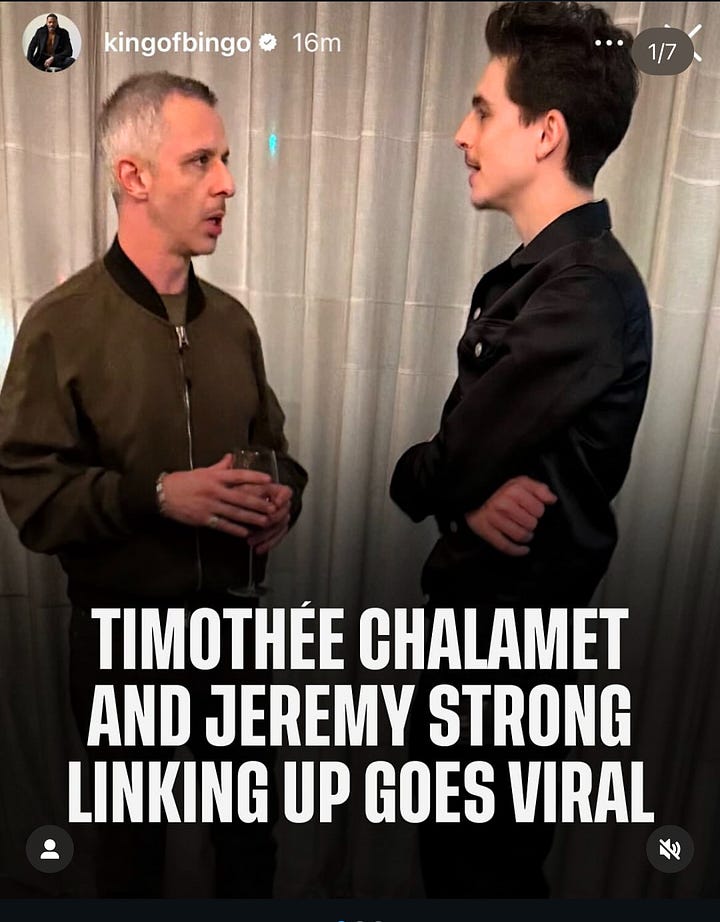
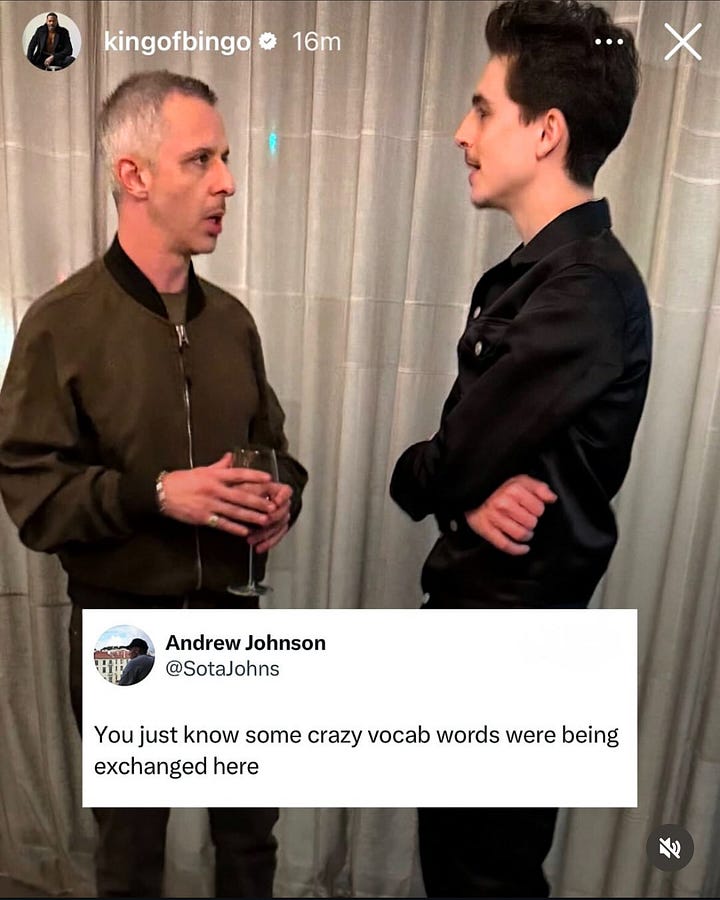
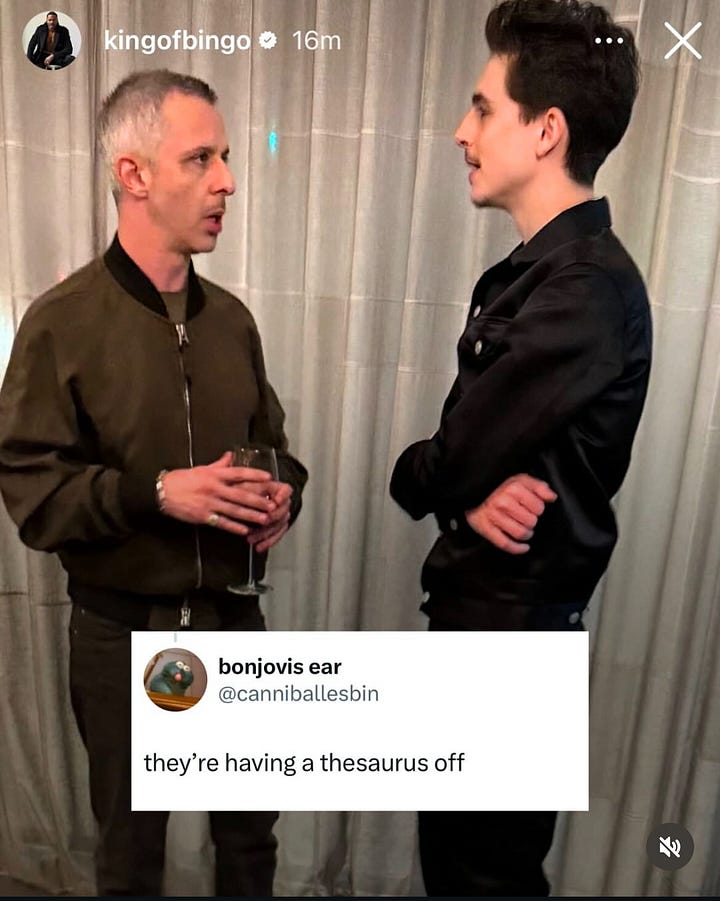
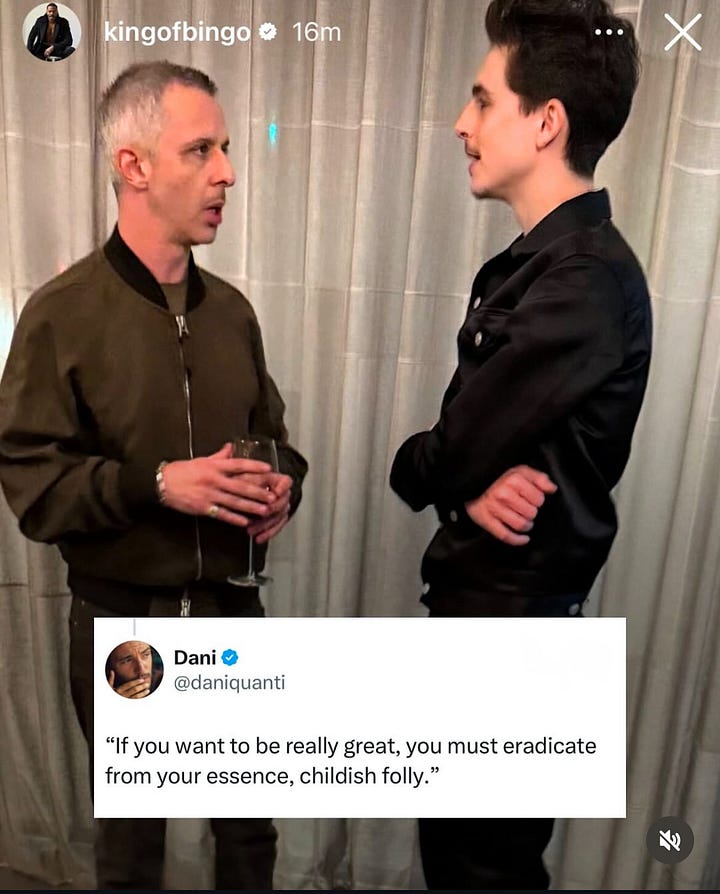
To remind you, they are actors whose literal job is dependent on good expression and communication. It should not be a big deal for us to see them have a good vocabulary and diction. Less so, be a joke.
When everything is a joke, nothing is funny.
There’s been a general shift in the air where more than some people have recognised this sickening seasoning of irony in every subject of life. A large part of it is owed to the evolution of the caricature that is Elon Musk, sitting in the power of influencing global media and policy, one meme at a time.
I curated an IG post about the general sentiment here:
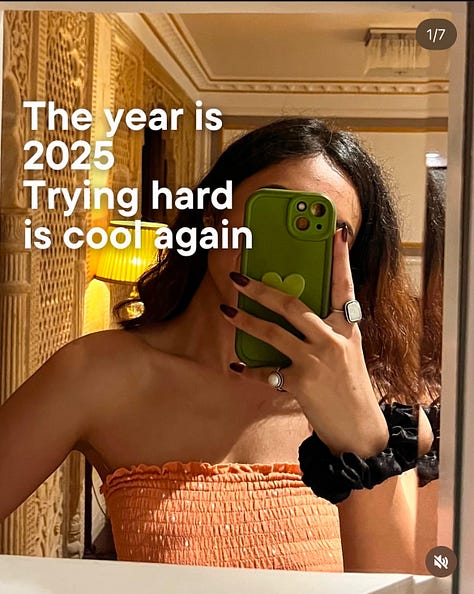
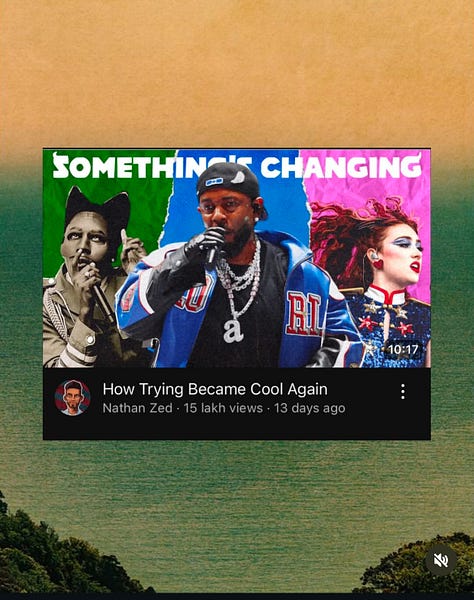
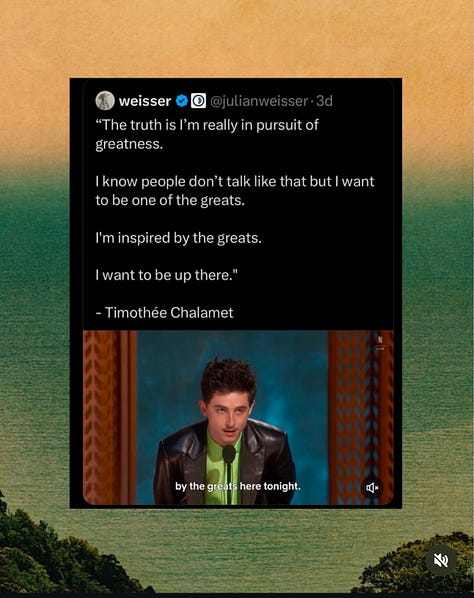
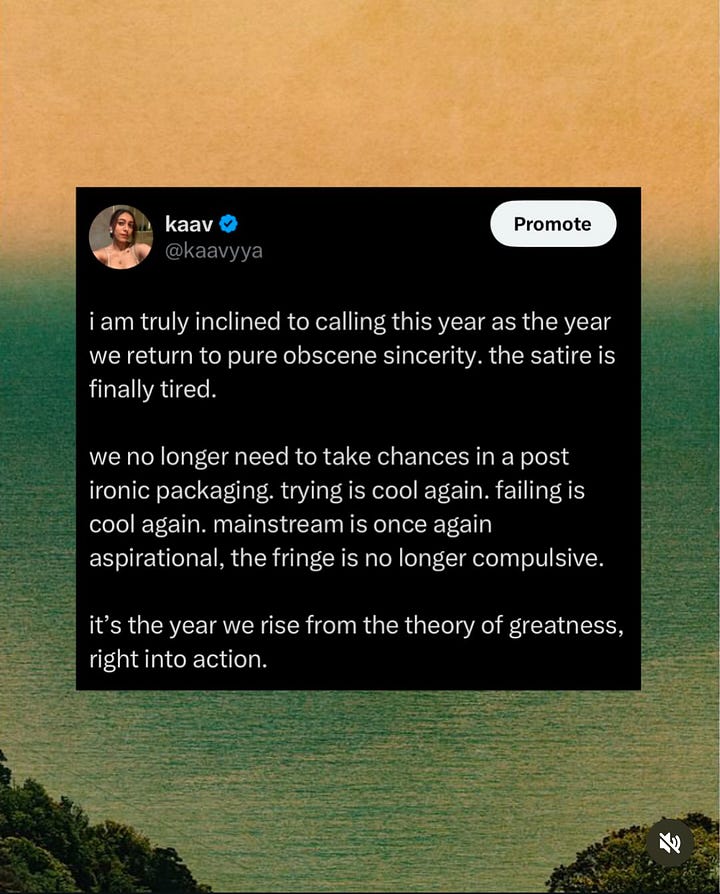
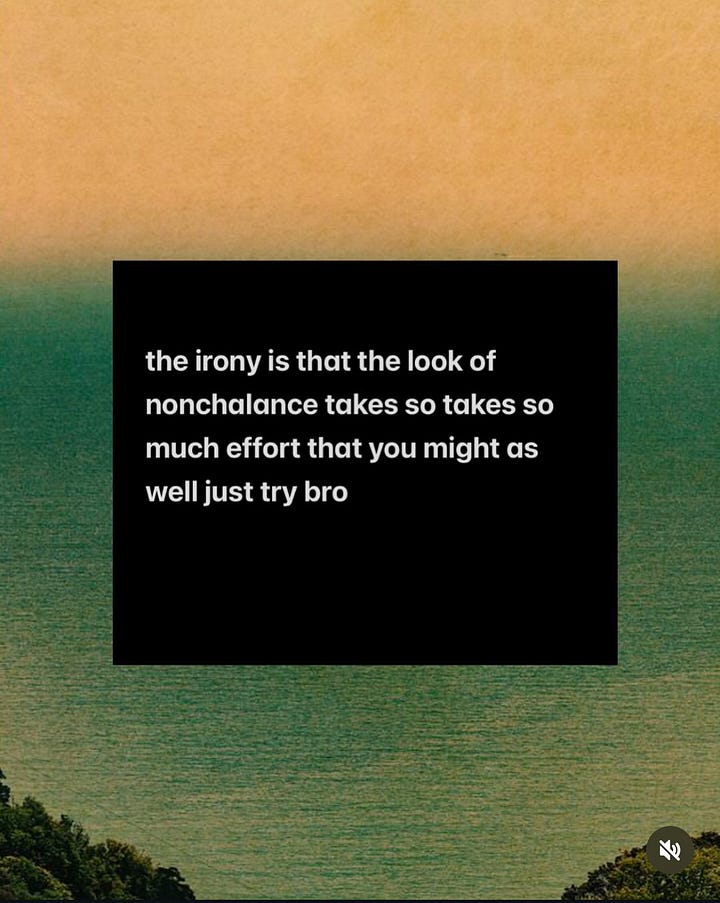
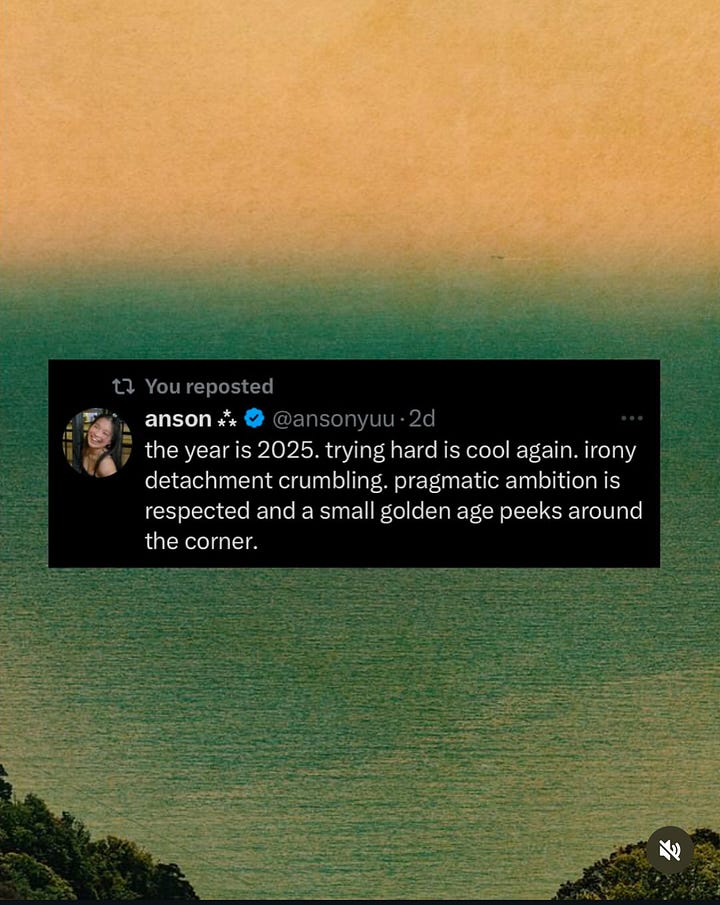
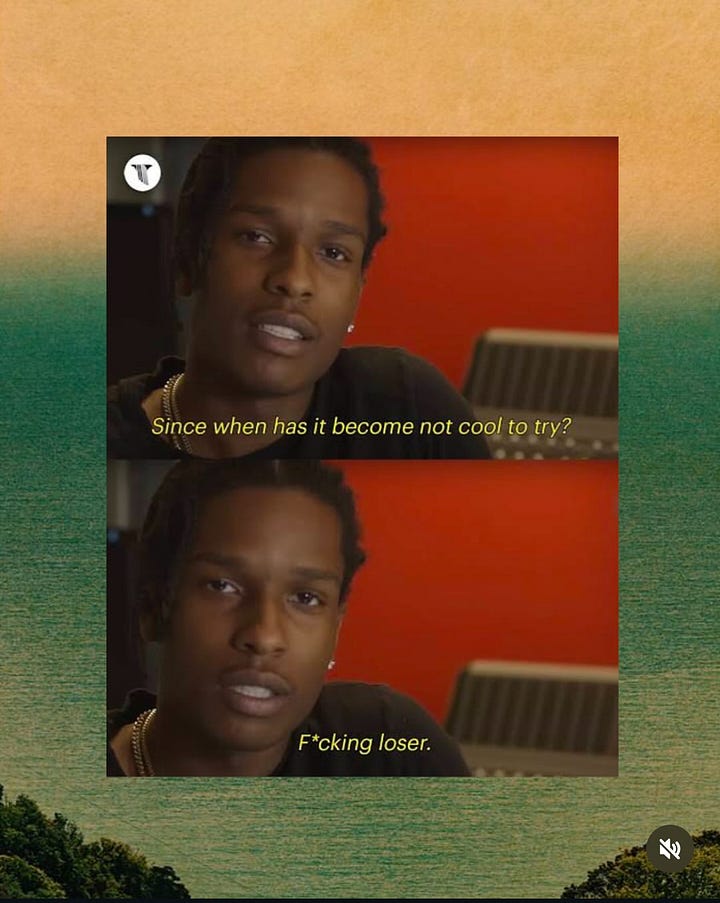
Mina Le, my favorite YouTuber, has done an excellent breakdown on the end of sincerity and “Why social media isn't fun anymore”. She talks about how post-modernism—the cultural movement that challenges traditional ideas of truth and universal values—is on the brink of exhausting itself.
It leads to a popular quote by David Foster Wallace:
Postmodern irony and cynicism’s become an end in itself, a measure of hip sophistication and literary savvy. Few artists dare to try to talk about ways of working toward redeeming what’s wrong, because they’ll look sentimental and naive to all the weary ironists. Irony’s gone from liberating to enslaving. There’s some great essay somewhere that has a line about irony being the song of the prisoner who’s come to love his cage.”
When you play into irony too hard, you end up psyoping yourself and then seriously believing the controversial ideas you once made fun of. I know I am the easiest prey to it because I started ironically talking a lot about Mark Zuckerberg after the Cambridge Analytica documentary in 2020, and now I unironically cheer for him on my Instagram stories when I see him in a Rahul Misra fit.
It also reminded me of when Bo Burnham (my favorite boy) wrote the “CEO, entrepreneur, born in 1964, Bezos, JEFFREY BEZOS” song as the satirical anti-capitalism anthem for his film ‘Inside’. The song became so popular on TikTok and Reels that it was used as a template for everyday memes. It got to the point where we had videos of Jeff Bezos flying in his Blue Origin rocket for a space vacation while the Jeffrey Bezos song played unironically, completely dissolving its original meaning. You know your satire has fallen flat on its face when the person you're trying to critique not only remains unaffected but uses it to further their own agenda. And this is not a failure attributed to Bo, the artist, but a failure on us, the consumers and respondents of art.
The current online environment has made me nostalgic for the internet I grew up with (which might or might not have something to do with the fact that I get keep getting cancelled on Twitter everyday)
I've been wrestling with thoughts of whether the internet is actually that bad (it decralised the stage by creating an open market for anyone to capitalise their talent and democratized fame) or if I'm just being a hater again ((I do not want to watch another aesthetic 60-second "day in the life" vlog where your life's purpose is to film the life you’re living in hope for a better life so you can film that as well to sell some stuff, while your existence is exposed for constant public consumption and conflicts with no space left for you to have feelings without the urge to talk about them on camera)
I'm sick of the pressure to document everything—we document more than we live. You might have 48,783 loyal followers on your vlog who you’d assume care about you, but would they care about your life as much if you stripped it off the perfect lighting, frame, music, and aesthetic? They look at your life but only to instantly think of their own in comparison.
We watch "day in the life" vlogs only to think about how we should start our own to inspire 50 more people to start theirs. But to what end? What will we do with so many days of so many lives sitting in our heads? What do they mean to us, and when do the digital lives of others start overwriting the memories of the life we live ourselves?
My writing is a little rusty right now, but I'm going to share more fragmented, half-baked thots in hopes that someone can pick them and weave something better of it. When you do, please write to me.
In the meantime, I'm attaching below links to some material that helped me think about these things better. Also, a change in my brand: I am not a hater; I am only a lover of a better world.


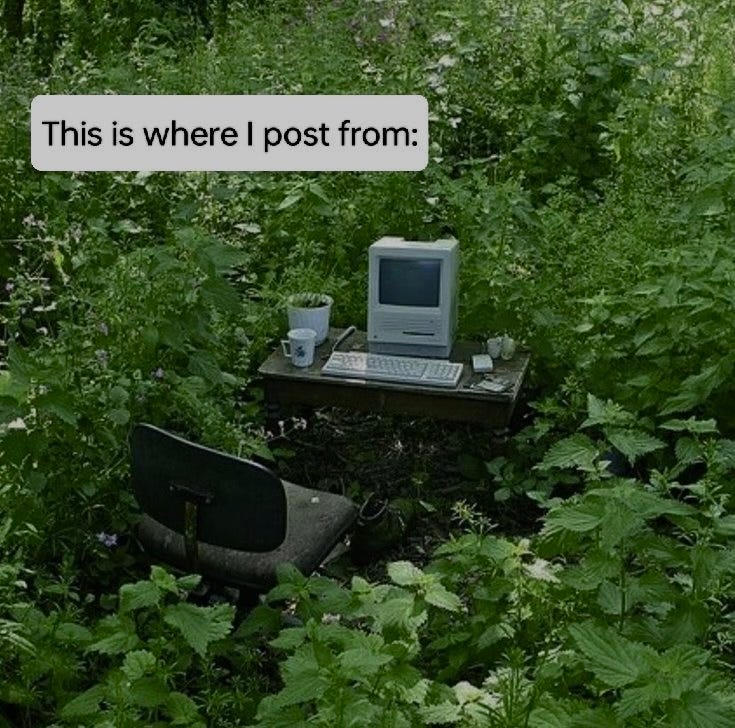
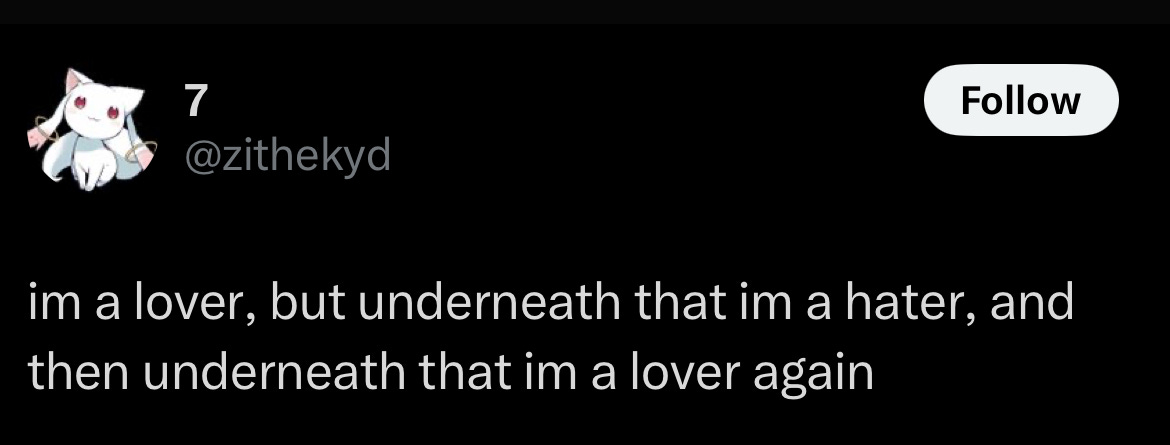



"You know your satire has fallen flat on its face when the person you're trying to critique not only remains unaffected but uses it to further their own agenda."
Reminded me of the origin and subsequent story of Monopoly, the board game. :)
Welcome back! Hoping to read more from you soon.
Read the whole post, nicely written. I enjoyed it and at the end saw a link follow me on twitter. At that exact moment I laughed. You finally fulfilled the whole purpose of this blog post.